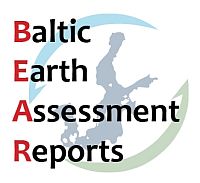 Bear in mind.... Bear in mind....
One of the goals of Baltic Earth when it inherited BALTEX, was the establishment of assessment reports of the current state of the science in different research fields in the Baltic Earth context, similar to the BACC approach for climate change. Now, 6 years after the founding of Baltic Earth, and 2 international conferences, 23 workshops/seminars/sessions and 5 summer schools later, a series of extensive assessment reports, called BEAR (Baltic Earth Assessment Reports), is underway. For each of the Baltic Earth Grand Challenges, a team of experts from the Baltic Earth network is wrapping up the current state of knowledge in the respective research fields, including uncertainties and gaps in knowledge. For each report, a lead author (mostly from the corresponding Working Group) is responsible for the coordination of the writing process, but many co-authors will be invited to contribute to the respective reports. In addition to the 6 Grand Challenges, three topics will be assessed due to the great relevance for current research in the Baltic Sea region.
BEAR reports (with coordinating lead authors):
- Salinity dynamics in the Baltic Sea (GC1, Andreas Lehmann)
- Land-sea biogeochemical interlinkages in the Baltic Sea region (GC2, Gregor Rehder)
- Natural hazards and extreme events in the Baltic Sea region (GC3, Anna Rutgersson)
- Sea level dynamics and coastal erosion in the Baltic Sea region (GC4, Ralf Weisse)
- Regional variability of water and energy exchanges in the Baltic Sea region (GC5, Sergey Zhuravlev)
- Multiple drivers for Earth system changes in the Baltic Sea region (GC6, Marcus Reckermann)
- Coupled regional Earth system Modelling in the Baltic Sea region (BE topic, Matthias Gröger)
- Climate change and impacts in the Baltic Sea region (BACC III) (BE topic, Markus Meier)
- New climate observation systems (BE topic, Urmas Lips)
A special case of the BEAR reports is the assessment of regional climate change and its impacts. This report will be the update to BACC II, which had been published as a book in 2015. The upcoming report will add new knowledge and possibly challenge old knowledge, while summarizing but not repeating the valid information from BACC II.
The BEAR reports are envisaged to be published open access as a Special Issue in Earth System Dynamics, in late 2020/early 2021, after a rigorous external peer-review process. The reports will be established following the BACC principles, "by synthesis of material drawn comprehensively from the available scientifically legitimate literature (e.g. peer reviewed literature, conference proceedings, reports of scientific institutes). Studies whose results and conclusions cannot be reconciled with a consensus view but which are of a good scientific and technical standard should be taken into account. The assessment should thus encompass the knowledge about what scientists agree on but also identify cases of disagreement or knowledge gaps".
As for the previous two BACC endeavours, there will be a close collaboration with HELCOM, the intergovernmental organization for the protection of the marine environment of the Baltic Sea. HELCOM will integrate climate change aspects into their work, e.g. into the update of the HELCOM Baltic Sea Action Plan. Moreover, HELCOM will publish recapitulatory, easily accessible climate “fact sheets” for practitioners, decision makers and the public. Baltic Earth scientists will be part of the joint expert network on climate change by HELCOM and Baltic Earth (EN CLIME) which will be responsible for the scientific information of the fact sheets. EN CLIME will largely draw its information on BACC, BACC II and the BEAR reports.
BEAR principles (based on the BACC principles)
BEAR reports wrap together the currently available published scientific knowledge. They do not document unpublished research results. The essence of the work is the synthesis of material drawn comprehensively from the available scientifically legitimate literature (e.g. peer-reviewed literature, conference proceedings, and reports of scientific institutes). The work should encompass the knowledge about what scientists agree on but also identify cases of disagreement or knowledge gaps. |
BEAR Internal pages (for authors)
More on EN CLIME...
Link to the BEAR press release of 11 Dec 2018
German
English |

